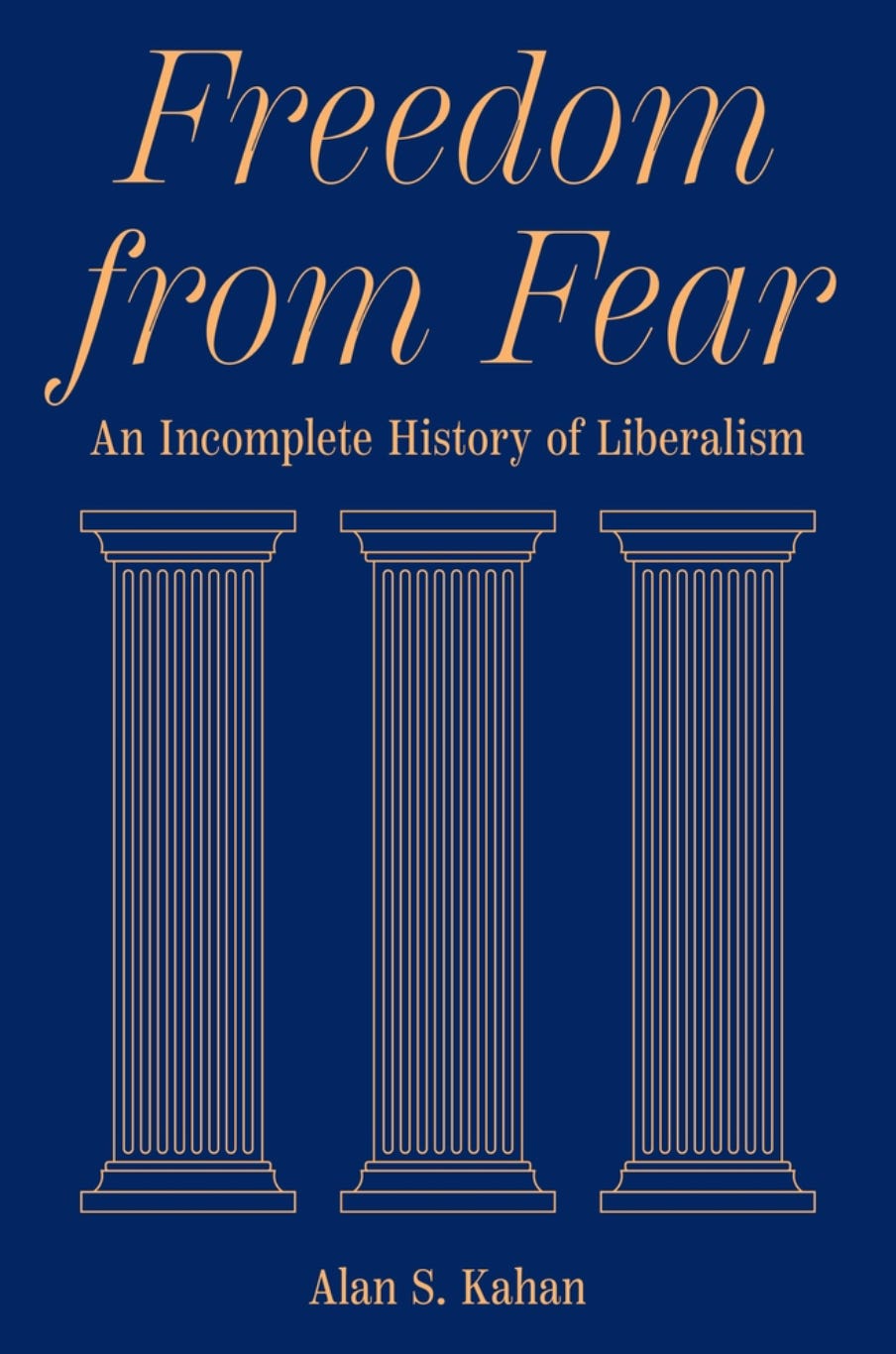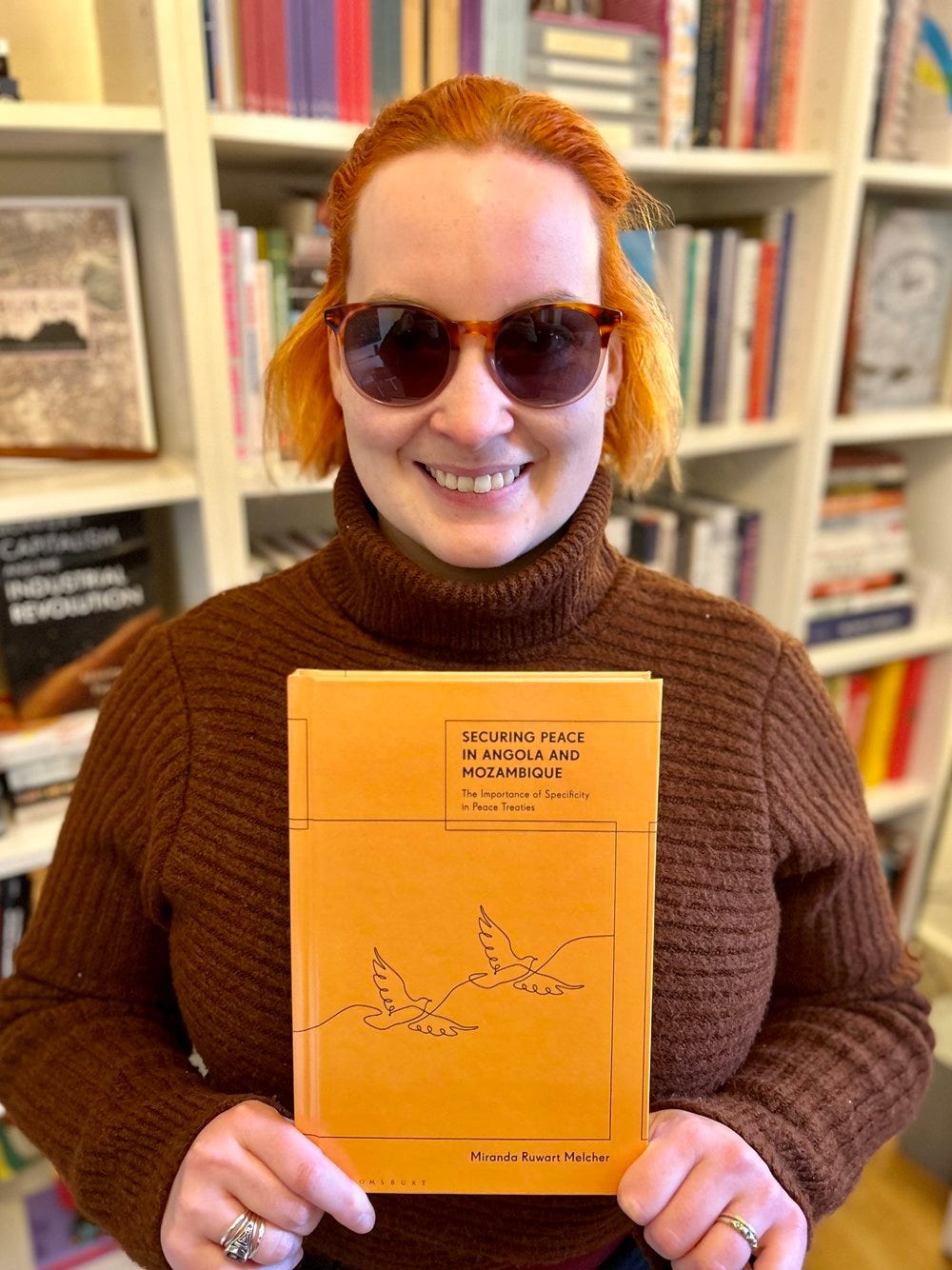The Crisis of Liberalism
Featuring a guided listen on the crisis of liberalism and an interview with Dr. Miranda Melcher
Three Podcasts to Understand … The Crisis of Liberalism
A recent article in the New Yorker pointed out a persistent, confounding aspect of liberalism: liberals themselves have trouble explaining what it is and consequently find it difficult to defend. Despite this ambiguity of definition, it’s hard to avoid proclamations that liberalism is in crisis. While not making any promises to simplify the subject, we present three NBN podcasts that help make sense of the crisis of liberalism.
The History of Liberalism: A Conversation with Alan Kahan
Alan Kahan’s book Freedom from Fear: An Incomplete History of Liberalism (Princeton UP, 2023) provides a definition of liberalism as “the search for a society in which no one need be afraid.” The attempt to create a society free from fear, according to Kahan, has bound the diverse manifestations of liberalism since its inception centuries ago. In the beginning, liberals wanted to be free from fear of despotic rule, as was evident in the French Revolution. In the 19th century, the fear became that of poverty, which wage and labor reform attempted to alleviate. And in the 20th century, the primary fear was that of totalitarianism. Related ideologies—like libertarianism—are offshoots of these strands (libertarianism being a particular type of anti-totalitarian liberalism).
Kahan argues that liberalism has tended to rest on three pillars— freedom, markets, and morals— and that since the end of the 20th century, the moral pillar has fallen away, succumbing to more sterile economic and political arguments. What has filled that void? Populism. Whether you agree with this analysis or not, Kahan provides a succinct overview of how liberalism has developed and the challenges it faces today.
Liberalism Against Itself: Cold War Intellectuals and the Making of Our Times
Samuel Moyn’s Liberalism Against Itself: Cold War Intellectuals and the Making of Our Times (Yale UP, 2023) allows us to take a closer look at how 20th century anti-totalitarian liberalism came to replace the earlier iterations that Kahan examines. The book aligns itself around Judith Shklar’s thesis that the Cold War era was the “last stage in liberal’s historic abandonment of the Enlightenment,” and treats this abandonment through several intellectual biographies of Cold War intellectuals like Shklar, Isaiah Berlin, Karl Popper, Gertrude Himmelfarb, Hannah Arendt, and Lionel Trilling.
The idea that the liberal abandonment of Jean-Jacques Rousseau and Romantic thinkers has left contemporary liberals in a bind fits neatly into Kahan’s proposition that liberalism has lost its “moral pillar.” Moyn cites the many outgrowths of Cold War liberalism— like neoliberalism— as evidence that Cold War liberalism is a fragile ideology, but he resists the calls of so-called post-liberals to find a wholly new political framework to stand up to populism. What we might do instead, he suggests, is engage in a rhetorical, rather than substantial, shift within the tradition of liberalism: call it by a different name and retain many liberal notions, while eschewing and confronting the apparent failings of liberalism.
Liberalism as a Way of Life
In Liberalism as a Way of Life (Princeton UP, 2024), Alexandre Lefebvre takes a different approach and examines how individuals can live according to liberal values despite the general characterization of liberalism as a political framework. This examination is done through commonplace examples, from tracing the evolution of swear words to treating the Parks and Recreation character Leslie Knope as a prime example of living according to liberal values. Lefebvre relies on John Rawls’ definition of liberalism— a fair system of cooperation from one generation to the next— as well as on the philosopher Pierre Hadot for his ideas on incorporating ideology into everyday individual behavior.
Drawing from Kierkegaard’s coining of “Christendom”, Lefebvre proposes that we are living in “liberaldom,” where most liberals are doing the easy rhetorical work without truly adhering to the commitments to personal freedom, fairness, and reciprocity that underpin liberalism. Perhaps the crisis of liberalism is as much an individual one as a political one. If this is indeed the case, Lefebvre ends by providing “17 reasons to be liberal;” in his words, a “clickbait-y” title that aims to provide a compass to a more fundamentally liberal way of life.
While listening to these three episodes— or books, if you choose to read them— won’t turn you into the preeminent expert on liberalism, it will clarify the history, principles, and intractable complexity of the subject, in addition to serving as an excellent starting point for further exploration. Let us know in the comments if there are other books or podcasts on liberalism readers might also appreciate.
-Leo Bader
Scholarly Sources
Dr. Miranda Melcher earned her PhD in Defence Studies from King’s College London, where she researched how to negotiate and implement peace treaties. She is currently an an educational technologist in the Learning Enhancement and Development (LEaD) department at City, University of London.
Listen to Margot Tudor interview Miranda about her new book, Securing Peace in Angola and Mozambique: The Importance of Specificity in Peace Treaties.
Q: Who should read Securing Peace in Angola and Mozambique: The Importance of Specificity in Peace Treaties and why?
A: My new book Securing Peace in Angola and Mozambique: The Importance of Specificity in Peace Treaties investigates how peace treaties for civil wars are negotiated, written, and implemented. Using the case studies of the civil wars in Angola and Mozambique, which are understudied and yet (unfortunately) have many similarities to ongoing civil wars, I dive into the UN archives and interviews with people involved in the negotiations to figure out how this often murky process of negotiating peace actually happens.
The book is likely to be helpful to those studying peace and conflict including those in history, political science, and international relations. Securing Peace in Angola and Mozambique emphasizes the importance of logistics, dignity, and pragmatism, which may be especially of interest for people working on these kinds of issues on the ground, including those in militaries. Finally, the book is written as a readable, historically inflected book that will be of interest to general readers who read news stories about wars and want to know more about what is actually happening behind the headlines.
Q: You're one of the most prolific hosts in the history of the New Books Network. How does hosting impact your work as a scholar?
A: Hosting has been hugely beneficial to me. Most simply, it’s a big confidence boost to cold email someone whose work you admire (and they reply). And say yes to speaking with you! Definitely encouraging and something that spills over into other areas. It’s also a great way to keep up with new developments in my field, as well as expand my knowledge beyond my research area in a way that we often don’t get to do as scholars so focused on our own niches.
Practically, I’ve received amazing support from a number of authors I’ve interviewed in terms of publishing my own work. From early on in the process, when I was barely thinking about publishing, getting encouragement from authors that I should go for it, advice about how to assess publishers, and even getting to see their book proposals for inspiration in writing mine was invaluable.
Finally, it’s fun! And that is important in our work as scholars: remembering why we got into this in the first place. There’s never just one reason for doing research, or staying in this scholarly world, but one reason is at some point, it was fun. There are so many pressures and ways to lose sight of that, and getting to read such a range of great work— and then speak to people about the projects they are so enthusiastic about— I find it gets me excited about research and being in this community, too.
Q: What advice would you give to scholars considering hosting for the New Books Network?
A: It’s fun!! It’s not something I had ever thought of doing until I started. I don’t think there’s a “necessary list of requirements” to be good at it beyond enjoying reading and wanting to help authors show off their work. So, if you’re interested, give it a go! It’s wonderfully flexible and can be what you make of it.
Also, I’m always happy to chat to current and prospective hosts, so feel free to reach out if you’d like to learn more.
Q: How do you approach hosting?
A: I have all sorts of spreadsheets and processes, but the main thing I keep in mind is that my role is to help the author showcase their work to a wide audience. My goal is to work with the author to create a “highlights tour” of the book. To me, this means designing questions that assume listeners probably haven’t read the book, accepting the fact that we won’t cover every aspect of the book in detail, and ensuring that the focus remains on the author and their work, not my response to it.
This also means it’s important to make authors as comfortable and as confident as possible. I send questions a week in advance and constantly improve the FAQ that I give authors in the initial invite and in subsequent organizing emails before the interview. Surely the hard part is researching, writing, and publishing a book— I don’t want the interview on the NBN with me to be as intimidating as those stages for authors who have agreed to share their work.
Q: What is your favorite book or essay to assign or give to people and why?
A: This has definitely changed over my time teaching, but the through line tends to be papers, books, or interviews that add nuance or critique to “the usual way of doing/thinking.”
I don’t currently do a lot of teaching (sadly, hoping to get back to that), so I currently express this interest through the books I choose to interview on the NBN. Although there isn’t much consistency in terms of discipline, time period, or topic of books I like, the aspect the books most frequently have in common is the ability to interrogate and subvert preconceptions about topics that have been neglected in scholarship (or are being analyzed through a niche, novel lens).
This tends to be what I most enjoy reading, but also what I think is often the most important type of thinking for students to be exposed to, regardless of the topic. It’s also what’s driven my own research (including my new book): being confused by conflicting information within the literature, and between literature and practice, and wanting to figure out answers.
Q: What are you reading right now?
A: Many books that I’m looking forward to interviewing about on the NBN soon! One of the things I love most about being a host is always having more books to read.







